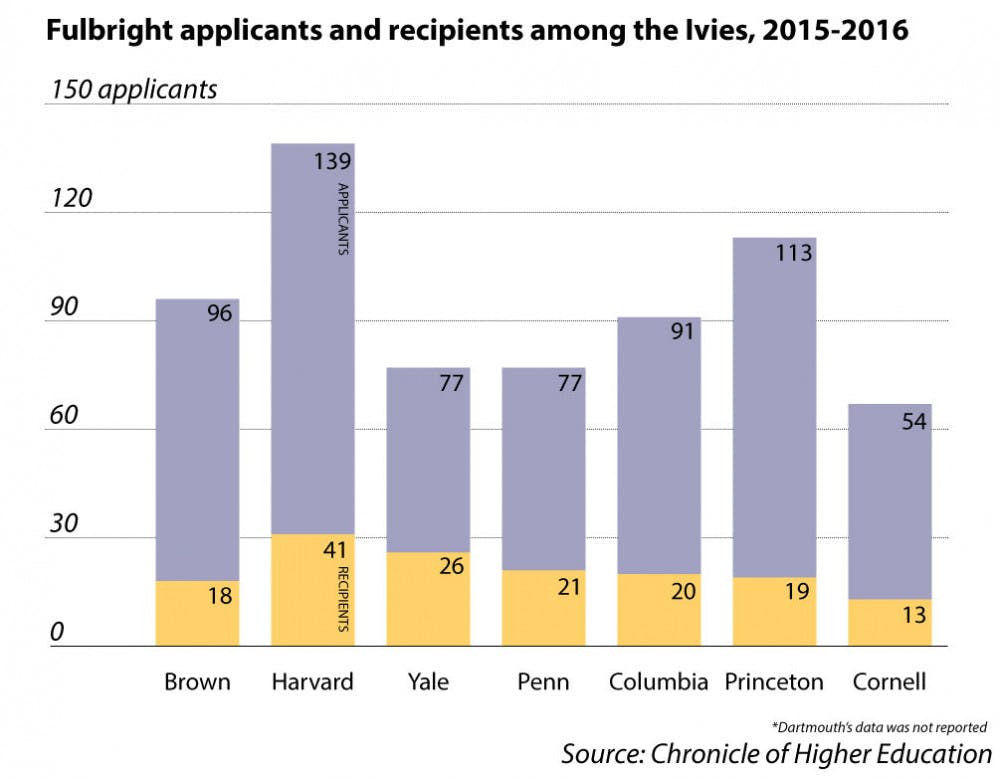Eighteen of Brown’s 96 Fulbright scholarship applicants received the award for the 2015-2016 application cycle, placing the University among the nation’s top producers of Fulbright scholars, according to the Chronicle of Higher Education.
Offering grants in over 140 countries, the U.S. government-sponsored Fulbright program provides recent alums and graduate students the opportunity to spend a year teaching English, pursuing an independent study project or attending a graduate program abroad, said Associate Dean of the College for Fellowships Linda Dunleavy. The U.S. student program currently awards approximately 1,500 grants annually and assesses applicants based on such factors as language preparation and the extent to which a candidate’s proposed course of study will promote mutual understanding between the United States and other countries.
Asia Nelson ’15, a 2014-2015 Fulbright recipient, wrote in an email to The Herald that both her experience teaching through the Brown Refugee Youth Tutoring and Enrichment program and the course and study abroad opportunities offered by the University prepared her for work as a Fulbright scholar.
“Whether it was the chance to study abroad in Hong Kong or to take intensive Chinese classes five days per week … I was constantly immersed in the Chinese language, the culture and the fact that there is a whole world that exists outside of the (United States),” wrote Nelson, who is currently serving as an English teaching assistant and cultural ambassador for the United States in Taiwan.
Jeffrey Lam ’16, a 2015-2016 recipient who will be conducting public health research in Vietnam, also said that the University’s open curriculum equipped him to participate in the Fulbright program.
“The flexibility in curriculum is a huge help because to study abroad and do research in another country you have to be open-minded; you have to have a lot of multi-disciplinary coursework,” he said.
Brown students are ideal candidates for Fulbright grants, Dunleavy said.
“There are a lot of students on campus who I think have done theses or capstone projects or have pursued independent research with a faculty member,” she said, adding that this experience prepares students for the independent research component of the Fulbright.
While large research institutions such as Harvard and Yale yielded more 2015-2016 grants than Brown, which ranked 12th among research universities, Dunleavy said that — unlike Brown — these schools have the advantage of many applicants attending graduate school.
The University’s applicants are mostly undergraduates or alums of the undergraduate program, rather than graduate students, Dunleavy said. The University’s Fulbright statistics also do not take into account the roughly one to four award recipients each year who do not accept their grants, Dunleavy added.
The University’s 2015-2016 application and acceptance rates are consistent with those from previous years.
Throughout the years, the University has promoted student success in the Fulbright application process by providing workshops and application advice to interested students, Dunleavy said. An internal University committee reads the applications and offers students feedback to strengthen their bids for the national process, Dunleavy added.
Both Nelson and Lam chose to pursue Fulbright grants because of previous experiences in Taiwan and Vietnam, respectively.
“I had studied abroad in Hong Kong my junior fall with a Brown program and found myself intrigued by the Chinese language and that area of the world,” Nelson wrote. “While abroad, I had a chance to visit Taiwan for a short weekend trip and fell in love with the people, culture and food.”
Lam wrote a research paper on mental health in Vietnam and studied abroad in the country, pursuing a comparative public health program. “Actually going to Vietnam for my study abroad and seeing the actuality of mental illness in Vietnam versus what was in my paper — it just further motivated me to want to learn more,” he said.
Though Nelson teaches over 600 children per week at two elementary schools, she wrote that her Fulbright grant has afforded her ample time to immerse herself in Taiwanese culture in more informal ways. She has had “opportunities to attend traditional Taiwanese weddings, take calligraphy lessons, have coffee dates with (her) host family and explore.”





